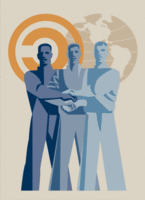| Friday, March 11, 2005 |  |
|
|
|
 From the homepage of Edward Castronova, Associate Professor of Telecommunications at Indiana University, via Bala Pillai: From the homepage of Edward Castronova, Associate Professor of Telecommunications at Indiana University, via Bala Pillai:I specialize in the study of synthetic worlds: massively multi-user spaces on the internet. People in these worlds create virtual items to use there – magic wands and whatnot – and they’ve begun buying and selling them on eBay. eBay’s category 1654, 'Internet Games' includes most of the non-Asian trade in virtual items and currency, and as you can see, this is a very active market. (If you are not familiar with virtual item trading, please see this introduction.)
Based on these auction data, I've been able to estimate that the global online sales volume in virtual items is at least $100 million annually and quite probably much more. This external, internet-based trade volume seems to be only about 1/20th of the trade volume within the worlds, meaning that the in-world trade probably amounts to more than $2 billion annually. At that level, it is comparable to economic activity in many small regions, provinces, and even a few countries. Synthetic worlds have even been colonized, effectively, by independent companies, that do nothing but farm items and gold pieces for sale to third parties. At least one such company is known to maintain a low-wage workshop in Hong Kong, to manage a high volume of sales and deliveries of farmed items.
The videogame companies that operate the most popular synthetic worlds – some of which have millions of users – are currently deliberating how to respond: should they try to capitalize on this money flow, or shut it down? If they encourage virtual item trading in real currencies, if only to take a slice off the top, their virtual economies will merge into the real-world economy, with real-world taxation, regulation, and legal obligation being an unavoidable consequence. If they shut down the eBay trade (which, after all, is against the rules of these places as games), they close off a revenue source as well as a part of the game that many users think is great fun.
The lesson for serious people outside the videogame industry is this: like it or not, real life is genuinely and observably migrating online for many millions of people, in its personal, social, economic, and even political aspects. In the new frontier, the features of the real body or the ability to do real-world work are no longer important. What matters is that you can get along with others while doing quite fantastical, quite fun things – slaying dragons, casting spells, performing resurrections, building castles. New frontier, new rules.
At this point we do not know how many people will eventually find a fantastical society preferable to our own. It could be hundreds of millions. If so, we are in for some fairly dramatic changes in society, economy, and politics over the next few generations. Dramatic indeed. Particularly as the technology advances and a virtual reality eventually, before too long, will be as real as the physical reality. I.e. with all the senses involved. The holodeck kind of thing is likely to happen within the next 20 years, and probably sooner, so it will be entirely possible to move large chunks of our lives into virtual realities. And as the activity becomes economic, it increasingly won't just be something to do for recreation. It will be places to work and study, in addition to being places to play and meet people. And, no, it isn't just a bad thing, of people becoming addicted to illusionary realities, without dealing with the real world. The virtual spaces will increasingly become the real world too. And the nice part is that virtual resources are basically unlimited, so it might be a driver for economic abundance, no longer hindered by limited physical resources.
[ Culture | 2005-03-11 17:47 | | PermaLink ] More >
|
|
|
|
 Second Life is a massively multiplayer online world. One can build stuff, design one's own avatars (virtual bodies), one can program it. One is the owner of what one creates and there's opportuties for trade and business. Via BoingBoing, here are some notes from a speech by Cory Ondrejka, the VP of Product Development for Linden Labs, the company that makes it. Second Life is a massively multiplayer online world. One can build stuff, design one's own avatars (virtual bodies), one can program it. One is the owner of what one creates and there's opportuties for trade and business. Via BoingBoing, here are some notes from a speech by Cory Ondrejka, the VP of Product Development for Linden Labs, the company that makes it.Second Life allows users to collaborate and teach each other. Learning scripting: it’s easy, you have immediate feedback, and other people are willing to help. People spread knowledge and do FAQs. SL really encourages this. As an example: skydiving classes, ingame. Players sell lessons and parachutes. Skydiving became a huge fad in SL for a while. Abbot’s Skydiving sells equipment and airplanes to go up in. An elevator to 4000 feet. Total freedom to create. A service.
Another example of collaborative business: VERTU is a group in RL. They contacted the EFF and wanted to do a fundraise in SL. They raised 1700 bucks. Next month (for Charity X) they did 1900. Then for Hurricane Relief = 2000 US. People in these spaces recognise the virtual currency has value. Philanthropy, giving .. having an impact back on the RL is a real possibility.
Tringo, the current SL fad. A cross between tetris and bingo. Someone in SL wanted a fun social game to play ingame. He created Tringo. In the 3 months since, he’s generated the equivalent of 4000 US in Tringo. He just licensed the realworld distribution rights to Tringo to a mobile game company. Because SL lets him maintain the rights to his IP, he can distribute said rights in the real world, although apparently part of the deal is that he continues to manage the rights individually ingame. Gee, I don't have time, but I could really get into that. I was hooked on Alphaworld, oh, almost 10 years ago. My buildings were still there, last I looked. But the environment didn't advance a whole lot since then, and there wasn't all that many people there. And there are so many more cool things one can do with virtual worlds. I've of course noticed that games have gotten much more fancy graphically in the meantime. But I don't have any particular interest in the types of games where you walk around and get killed all the time, by folks who've got bigger guns than you have. But I like building stuff. Second Life looks quite similar to Alphaworld, so it is not that things have advanced enormously. But the increased programability makes the difference. Sounds like Second Life is getting a lot of things right. So, if I just had some quiet weekends with nothing to do.
[ Culture | 2005-03-11 12:19 | 0 comments | PermaLink ]
|
|
| Wednesday, February 16, 2005 |  |
|
|
|
 Some psychologists are studying how people's perception of available time changes when it is in the future. Article in New Scientist: Some psychologists are studying how people's perception of available time changes when it is in the future. Article in New Scientist:The best time to ask someone for a favour is at least several weeks in advance, a new study suggests. The research finds that people consistently over-commit because they expect to have more time in the future than they do right now.
Previous studies have shown that people generally "value things less in the future than now", says Gal Zauberman, a consumer-behaviour researcher at the University of North Carolina in Chapel Hill, US. For example, many people prefer to pay for something in a week's time rather than today - even if it costs slightly more.
Now, Zauberman and colleague John Lynch at Duke University in Durham, North Carolina, have found that this tendency is even stronger for time than for money.
"When asked to do something far in the future, we usually say 'yes'. Sure, I'll be happy to help you write a paper or move apartments," Zauberman told New Scientist. "People always like to delay things, but they are more optimistic about changes in time than in money."
So, they did experiments and asked a bunch of people questions, elliciting how much time and money they felt they had available now, and at various future times. For both, most people will act as if they'll have more of them in the future. But more so with time than with money. And the further it is into the future, the more likely it is we think we have the time, and the more likely it is we'll say yes to activities we couldn't possibly say yes to right now.
How can we be so wrong? I do that too, of course. But if I really look at it, I'm terribly busy right now, and I only seem to get busier. Whether I'll have money or not, I can't say, but it certainly seems I get more and more to do per unit of time. So, in the moment I struggle to focus on the most important things, and I say no to lots of things. But ask me to help you later, in a few weeks, with something ridiculously time consuming and open-ended which I don't really feel like doing, and I might say yes. Maybe mainly to be nice, but it somehow feels safe to promise it "later", even if it is idiotic, and sooner or later that time comes, and I'll regret it.
I'm sure that time organization in many ways is a key to success and peace of mind in life. Particularly that little thing on whether you fill up your future with lots of work intensive junk you've promised to do, or whether you do the opposite: arranging things now so that your future will be uncommitted and open.
[ Culture | 2005-02-16 14:53 | | PermaLink ] More >
|
|
| Sunday, February 6, 2005 |  |
|
|
|
 Via BoingBoing and others. Somebody found a book in the supermarket called "My Little Golden Book About God" and decided to remix it a little. You know, it is one of those little supposedly cuddly and sweet religious things about the glory of God. Which for some reason often are filled with strange drawings of kids that look really psychotic. So it is quite appropriate to change it into the story of the evil Zoggs who're carrying out their master plan of turning humans into their slaves. Very masterfully done. Via BoingBoing and others. Somebody found a book in the supermarket called "My Little Golden Book About God" and decided to remix it a little. You know, it is one of those little supposedly cuddly and sweet religious things about the glory of God. Which for some reason often are filled with strange drawings of kids that look really psychotic. So it is quite appropriate to change it into the story of the evil Zoggs who're carrying out their master plan of turning humans into their slaves. Very masterfully done.
[ Culture | 2005-02-06 14:16 | | PermaLink ] More >
|
|
| Saturday, January 8, 2005 |  |
|
|
|
 Bill Gates did an interview last week where he essentially labeled all those folks who are into free software and sharing of content with liberal licenses and that kind of frivolity as a modern form of communists. So, great, some clever folks, made some nice commie graphics for the occasion. See BoingBoing here, here, and here. So, join the revolution, comrades. Bill Gates did an interview last week where he essentially labeled all those folks who are into free software and sharing of content with liberal licenses and that kind of frivolity as a modern form of communists. So, great, some clever folks, made some nice commie graphics for the occasion. See BoingBoing here, here, and here. So, join the revolution, comrades.
In case you somehow don't know, that reverse C in the circle is the copyleft symbol. Copyleft is the license you apply to work that is free and that must remain free. Pure communism, of course.
[ Culture | 2005-01-08 20:07 | | PermaLink ] More >

|
|
| Saturday, December 18, 2004 |  |
|
|
|
 A posting on Metafilter about a mysterious, eh, project, called Neurocam.: A posting on Metafilter about a mysterious, eh, project, called Neurocam.:A billboard appears near a Melbourne freeway entrance inviting people to "Get out of their mind". "Those who follow the instructions on the neurocam website are assigned missions, with the threat of grave consequences should these tasks not be carried out. Individuals prove their mettle by completing progressively more complex, riskier assignments - possibly of questionable legality."
Is it an art project, a cult, a marketing ploy, a game or a psychological experiment? Neurocam says none of these. Melbourne's Age newspaper investigates (free reg sometimes req'd). You can also read some blogs from participants here and here. Plus it seems to have something to do with this place dealing in Human Possibility(TM), which makes as little sense as the rest of it.
Reading the second blog there... hm, very interesting. Kind of like The Game. I'd be very tempted to join if I were in Melbourne. Mindlessly delivering packages, without knowing whether they contain drugs or explosives. But it is fun to be a secret agent.
I bet it is a psychological experiment. It will show how thrilled we are to do stuff we don't really know the consequences of, if we're just played the right way.
[ Culture | 2004-12-18 17:48 | | PermaLink ] More >
|
|
| Wednesday, December 1, 2004 |  |
|
|
|
 It is often said that eskimos have a large numbers of words for types of snow, like 60 or so. And almost as often somebody will claim that it is an unfounded falsehood. Somebody even wrote a book on that basis. But now some folks have actually done the logical thing and investigated it a bit. And maybe it isn't exactly 60, but it is at least 32. These are from the Inupiat Eskimo Dictionary by Webster and Zibell: It is often said that eskimos have a large numbers of words for types of snow, like 60 or so. And almost as often somebody will claim that it is an unfounded falsehood. Somebody even wrote a book on that basis. But now some folks have actually done the logical thing and investigated it a bit. And maybe it isn't exactly 60, but it is at least 32. These are from the Inupiat Eskimo Dictionary by Webster and Zibell:- apun: snow
- apingaut: first snowfall
- aput: spread-out snow
- kanik: frost
- kanigruak: frost on a living surface
- ayak: snow on clothes
- kannik: snowflake
- nutagak: powder snow
- aniu: packed snow
- aniuvak: snowbank
- natigvik: snowdrift
- kimaugruk: snowdrift that blocks something
- perksertok: drifting snow
- akelrorak: newly drifting snow
- mavsa: snowdrift overhead and about to fall
- kaiyuglak: rippled surface of snow
- pukak: sugar snow
- pokaktok: salt-like snow
- miulik: sleet
- massak: snow mixed with water
- auksalak: melting snow
- aniuk: snow for melting into water
- akillukkak: soft snow
- milik: very soft snow
- mitailak: soft snow covering an opening in an ice floe
- sillik: hard, crusty snow
- kiksrukak: glazed snow in a thaw
- mauya: snow that can be broken through
- katiksunik: light snow
- katiksugnik: light snow deep enough for walking
- apuuak: snow patch
- sisuuk: avalanche
There you go, 32. And, now that's what was found in a particular Inupiat to English dictionary. I can only guess that the guy who found it was an English-speaking person who searched a text file on "snow" and a few other things he could think of, like "sleet" and "frost". So I wouldn't be at all surprised if there were words and variations that weren't in the dictionary and words that weren't found because the English translation didn't mention "snow". Anyway, that was just one Eskimo dialect. Others get different, but similar sets of results. Around 30 root "lexemes" in another dialect. And those languages also seem to have a large number of possible inflections and conjugations and combinations based on the roots that could add up to hundreds of snow related words.
[ Culture | 2004-12-01 18:11 | | PermaLink ] More >
|
|
| Saturday, November 20, 2004 |  |
|
|
|
 Remember the fellow who ate nothing but McDonalds food for a month and got really sick. Now, this guy has vowed to drink nothing but Pepsi Holiday Spice for a month. He's already in pretty bad shape. Like constant diarrhea. Sounds like a really bad idea. Remember the fellow who ate nothing but McDonalds food for a month and got really sick. Now, this guy has vowed to drink nothing but Pepsi Holiday Spice for a month. He's already in pretty bad shape. Like constant diarrhea. Sounds like a really bad idea.
[ Culture | 2004-11-20 17:06 | | PermaLink ] More >
|
|
| Friday, November 19, 2004 |  |
|
|
|
Interesting article Questioning Authority, an interview with David Livingstone Smith, who's a bit of an authority on lying. He says some fairly eye opening things about how much all of us lie to ourselves and others a lot of the time. And, depending on the circumstances, it isn't always a bad thing.You say that self-deceived people are often mentally healthier than those who are honest with themselves.
Yes, lying to oneself promotes psychological well-being. Research shows that depressed people deceive themselves less than those who are mentally healthy. Frankly, if we did not deceive ourselves, I think we would go mad from distress. For example, the simple fact that we're all going to die, that there are various people in the world out to get us, that a good deal of the world lives in unrelenting misery and hunger-it's all enough to drive everyone bonkers. Unless we are capable of shielding ourselves from that, we would be constantly disturbed. It's why we worry more about missing our favorite TV show than about a dirty bomb going off in a terrorist attack.
Also, self-deception relieves us from a sense that we're constantly living in contradiction. We each have a set of values that we constantly violate. When you're aware of transgressing one of those values that you hold dear, you tend to feel bad about yourself. In deceiving ourselves, we relieve ourselves of that burden, making life a lot easier and lot more pleasant for ourselves. It's quite wonderful.
Finally, if we convince ourselves we're not really lying, we can lie far more effectively than might otherwise be the case. All of our social lies, like the fake smile, involve the manipulation of how others see us. Our lives are saturated with pretense and dishonesty. Although we claim to value truth above all else, we are also at least dimly aware that there is something antisocial about too much honesty.
Hm, so we kind of make the world more bearable and more pleasant by lying. Optimism is a kind of lying, I suppose. Anyway, he isn't exactly advocating that we should all become better liars. There are some social issues with it, of course: So should we value lying more than telling the truth, especially since you said that good liars have an advantage in life?
When I'm talking about advantage, I'm talking about what gives an individual organism success. But all sorts of things can give individual success. Killing one's rivals is an example, but just because it gives you an advantage doesn't morally justify it. Put it this way: If one thinks that individual advantage is the ultimate value in life, it would follow that one should work at becoming a very good, calculating liar. But encouraging lying to one's individual advantage will always receive social disapproval, because if you are taught to lie better, that's against everyone's interest. Just as it might be advantageous for each of us to lie, it's disadvantageous for each of us to be lied to. For lying to be advantageous, society has to place an emphasis on honesty. Unless we have a sense that there's truthfulness enough of the time, lying ceases to function. That's illustrated in the old story about the boy who cried wolf. If we get a situation where we're all cold-bloodedly out to lie to each other, we will lose trust in each other, lying will stop working, and the world would collapse under the weight of too much lying.
Well, how about if we said that it really depended on the intention, whether lying is appropriate or not? If I lie to myself and others to make our lives better, and it actually sticks, and there's no big letdown where they discover a different truth. That would be a good thing, no? If you're deadly sick and you walk up to a healer and he puts his hand on your forehead and with a loud and convincing voice says "You're healed!!", and you actually believe it, and you get up and walk out all cured, does it matter if he were only bluffing? If you're presented with an impossible situation, but you refuse to accept it, and you lie to yourself, and thereby you make it possible, and you solve it? Then you'd be a magical manifestor, rather than a liar. But if you lie to somebody else in order to sabotage them and give yourself an undeserved advantage, that would be the bad kind of lying, I suppose. And if you lie to yourself to make things worse than they realy are. Is the glass half full or half empty? Depends. Depends in part on where you're going with it. If you saw it half full, and you proceeded to fill it, your intention reveals itself. If you saw it half empty, and you proceeded to waste the rest, likewise.
[ Culture | 2004-11-19 18:49 | | PermaLink ] More >
|
|
| Thursday, November 18, 2004 |  |
|
|
|
 It is probably inevitable. The dollar is dropping, the euro is stronger than ever. The EU economy is growing. The rest of the world might not want to prop up the US economy forever. More countries are reconsidering using the dollar as their reserve currency. WorldChanging: It is probably inevitable. The dollar is dropping, the euro is stronger than ever. The EU economy is growing. The rest of the world might not want to prop up the US economy forever. More countries are reconsidering using the dollar as their reserve currency. WorldChanging: The International Monetary Fund might have to move some time in the next four years, according to Clyde Prestowitz, on the November 12, 2004 evening edition of public radio's Marketplace.
The development agency's charter dictates that it be located in the member country with the largest economy, and the IMF HQ has been in Washington, DC for nearly 60 years.
But the current U.S. federal deficit, as well as trade imbalances that have Americans consuming $600 billion more than they save or produce, may cause some international banks to reconsider their investments in the U.S., which could drop us down to second - or maybe further. Says Prestowitz:
We consider ourselves the unchallenged leader, the best ever, but the ground is really shifting beneath our feet...if one of the central banks of China, or Japan, or Korea, Taiwan or Singapore, decides that we're not such a hot investment anymore, the dollar will fall like a rock. In fact, some time in the next four years, the dollar is almost certain to drop by as much as 50% or even more against some key currencies...the E.U. is only a 10% drop away in the dollar's value from being the world's biggest economy, and Asia is on the march.
The U.S. will soon no longer have the highest per capita income or be the biggest market in the world for most products. It will no longer set all the standards. Our technological leadership will diminish.
Think about it. If we don't get our act together, it really won't take much to get those moving trucks rolling.
Some sources say the EU already is the world's biggest economy. I don't know where the numbers are. Anyway, now this nice article from Salon, Welcome to the New Cold War (click Free One Day Pass, if you're not a member). A specter is haunting America, and it ain't the specter of communism (however much George W. Bush and company might like to describe it that way). Barely a decade after the definitive collapse of the Soviet bloc, the United States finds itself in a new cold war, one being fought simultaneously on economic, political and cultural fronts, and one it is by no means certain to win. The unipolar world of uncontested American hegemony that we were told to expect into the indefinite future has come to an end; it lasted just about long enough for us to scratch our heads and wonder what was happening next.
Yes, "Old Europe," to borrow Donald Rumsfeld's famous quip, is back, and it's looking pretty spry for its age. As Americans are finally beginning to notice, Europeans (or most of them, anyway) have reconstituted themselves into an enormous transnational superstate of 25 nations, 455 million people and an $11 trillion economy. This is, of course, the European Union, and its aims have become much broader and deeper than the stuff you've probably heard about, like allowing citizens to drive from Seville to Sicily without a passport, or to use the same anonymous-looking currency to buy a pint of Guinness in Cork and a glass of ouzo in Crete.
Any studies done recently of quality of life or on personal freedom consistently show a long list of mostly European countries at the top. The US is not in the top ten. That the U.S. is the biggest military power doesn't change that. On the contrary. If the EU has no intention of confronting America's military supremacy, that, Rifkin and Reid would agree, is actually Europe's ace in the hole. Let the Americans pour endless billions in taxpayer dollars down the Pentagon's money sink, the Europeans reason. As they see it, the key to future peace and prosperity lies elsewhere, in constructing complex webs of social interaction and economic cooperation that will undermine nationalism and fundamentalism of all stripes. While the United States foots the bill for the intractable conflict in Iraq and piles up huge budget and trade deficits, Europe has spent money on other priorities. ...
The U.S. has fallen significantly behind the EU's Western European nations in infant mortality and life expectancy, despite spending more on healthcare per capita than any of them. (While 40 million Americans are uninsured, no one in Europe -- I repeat, not a single person -- lacks some form of healthcare coverage.)
European children are consistently better educated; the United States would rank ninth in the EU in reading, ninth in scientific literacy, and 13th in math. Twenty-two percent of American children grow up in poverty, which means that our country ranks 22nd out of the 23 industrialized nations, ahead of only Mexico and behind all 15 of the pre-2004 EU countries. What's more horrifying: the statistic itself or the fact that no American politician to the right of Dennis Kucinich would ever address it?
Perhaps more surprisingly, European business has not been strangled by the EU welfare state; in fact, quite the opposite is true. Europe has surpassed the United States in several high-tech and financial sectors, including wireless technology, grid computing and the insurance industry. The EU has a higher proportion of small businesses than the U.S., and their success rate is higher.
It is actually puzzling that EU can work so well. Huge bureaucracies everywhere, heavy taxation, and nobody really agrees on very much. The governments have lots of parties and rarely any unified direction. The populace usually isn't very happy with their governments, and complains about their countries a lot of the time. Lots of people in the EU countries aren't very happy with the whole EU thing, and have no great interest in being a super-state together with everybody else. Nobody's very sure what the EU's various bodies are doing.
But as the writer touches on, complex webs of relations and social interactions take place here. It is not so much about a unified direction that everybody's lining up behind. It is not about everybody agreeing. Rather, everybody's talking about everything all the time. Everything is something to have a dialogue about. Everything is to be discussed, and the outcome isn't clear in advance. It depends. And things happen based on those complex webs of relations, not necessarily based on orders from above.
And that's what makes the EU hugely different from the US. In the US things are much more simple. There are different sides that try to win, so they can decide what direction things go in. But there's hardly any public dialogue about anything. There's no culture of talking things over to find the right answers. There isn't much room for constructively having different opinions. You aren't taught to think that way, so only if you make a special effort will you make it there. You're typically for or against things.
People are probably more motivated in the U.S. More inclined to make a concerted effort to do something special, make a mark on the world. Where Europeans often are more cynical and less inclined to leave the fold. Except for in thought. Europeans overall tend to be much better informed about the world and prepared for discussing just about anything. But less inclined to personally and directly do anything about them.
But things don't only get done by personal inititative. Sometimes talk-first-and-act-later might be more effective than act-first-and-don't-think-too-much. A more complex networked inter-dependent society might do better than a simple top-down laissez-faire society.
[ Culture | 2004-11-18 18:58 | | PermaLink ] More >
|
|
| Tuesday, November 16, 2004 |  |
|
|
|
Via SmartMobs. In a research paper published in the December issue of FirstMonday.org, Kevin McGee and Jörgen Skågeby attempt to answer the question "Could the ability to give be one of the central features that determines the popularity and success of computer–mediated "sharing" activities, communities, applications, and services?"...there is another dimension to the sharing phenomenon that is not as widely discussed — and which suggests an unexplored opportunity for developers, providers, and consumers of digital media: the strong human desire to give, whether it is advice/assistance (newsgroups), digital goods (music, literature, software), or other resources (bandwidth, processing cycles). Much sharing is almost certainly motivated by reciprocity in one form or another; many times people clearly do "give in order to receive." But there are significant indications that some acts of sharing are difficult to explain easily in terms of reciprocity: it seems that some people simply enjoy non–reciprocal giving.
Should that really be so shocking? The joys of giving are of course not entirely one-sided. It is fun to give when one notices that it has a beneficial effect. Those effects are often bigger when one gives to do good as opposed to when one only gives to instantly get something else back.
[ Culture | 2004-11-16 22:37 | | PermaLink ] More >
|
|
| Friday, November 12, 2004 |  |
|
|
|
 I've never exactly liked multi-level marketing (MLM). Well, half of the time I hate it. It too often looks like being conned into shelling out a few hundred dollars for some supply of diet pills or something, and then you need to convince all your friends to sign up under you and get really excited about it. I've never exactly liked multi-level marketing (MLM). Well, half of the time I hate it. It too often looks like being conned into shelling out a few hundred dollars for some supply of diet pills or something, and then you need to convince all your friends to sign up under you and get really excited about it.
But then again, I like the idea of having thousands of people in my network who'll provide me with a continuous residual income. So, if I could do that without having to force my friends to buy some overpriced vitamins they don't want, I might change my mind.
At times it had seemed very attractive. I've known or met people who've done extremely well with MLM, and obviously, to see those folks who've done best can inspire a lot of other people. Like, I remember this event at the house of one of the top Herbalife people. Larry something. He had made 65 million dollars at the time. So it was a recruitment event in the basement disco of his Beverly Hills mansion. There were at least 500 people. It has ostrich feathers on the wall. His couple of Ferraris and Lamborghinis were strategically parked out front. Well, he seemed like a nice guy too. And they put on quite a show. Seemed like those vitamins cured cancer and just about anything else. And lots of previously normal little folks had great success stories to tell about how well they'd done on marketing it.
However inspiring it was, I didn't sign up more than maybe one or two people, who didn't do anything with it. My family ate the vitamins for a year or so, which was perfectly fine, albeit a little expensive.
And, statistically speaking, that's how it goes for most people who sign up in an MLM. They think it sounds great at first. They imagine themselves making 10s of thousands in residual income every month. They find the money for the starter package somewhere. And that's usually how far they get. Because they don't know how to be as inspiring as the people who hooked them on to it. And because their friends aren't really interested, and they don't know how to reach anybody else who is.
Even at those times when I temporarily thought it was a great idea, I've had moral qualms about the pyramid nature of it. I mean, obviously the scheme is in the shape of a pyramid. People sign up under somebody else, becoming part of their down-line. And the money they spend to join or to buy products is what goes to fund the people higher up. But you can pretty easily see it as a pyramid where a few people at the top are doing really well, some of them becoming millionaires, being able to tell great success stories. And the further we go down in the pyramid, the more dull it looks. At the bottom are people who paid money for nothing, or there are people who work at actually selling the product it all was about. Seems like there will have to be a great many loosers to fund a few winners.
But then it just struck me. This is really very similar to how a capitalist economy works. Most people haven't thought of it that way, but it is really structured as a pyramid scheme too. Except for that it is so complicated and cleverly done that it pretty much can keep going indefinitely, without anybody really noticing.
A capitalist economy works in part on the expectation that one can make investments that produce returns. I.e. you give something out and you get more back. Like, an investor invests in a company, or a bank gives a loan, and they want it back with interest. So the company does a bunch of things that does the same thing. They put the money into things that give more money back. I.e. they pass the buck to somebody else, in order to get a return for themselves and the people behind them. And so forth, through numerous steps. It is really inherently the same idea as a pyramid scheme. And at the bottom of the pyramid you find the people who do the actual work, or who buy the products. And they generally get less back than they put out. I.e. they work hard and get paid less than what it is worth, in order to finance that the people higher up in the scheme get their returns. Which produces our typical societal arrangement where a small percentage of people are doing really well, and the majority of people are just getting by, stuck in a daily routine.
You see it even more clearly in the way money is actually created in the first place. No, it doesn't inherenly come from hard work. It might fund some hard work later, but at its origin it has nothing whatsoever to do with it. A bank creates the money out of thin air, in order to lend it out. The bank has certain limits on how much money it can create, which is in ratio to how much money they currently have as actual deposits. Like, they can create 10 times as much money as what is deposited there. That money doesn't go anywhere. The money that is "lent" out is created as entries in a computer. The bank then puts that money at the disposal of somebody that they expect will be able to pay it back with interest. I.e. to somebody who will turn a profit from some activity, or who'll earn the extra money somewhere else, in order to pay it back.
Now, mind you, money can ONLY be created by a bank. Most governments retain the right to create money as well, but currently none of them do. Even most of the money the government borrows is created out of nothing by a bank, and the government needs to pay it back with interest.
Now, it shouldn't be very hard to notice that the math is in principle impossible. Certain amounts of money are being created, and more than that needs to come back. Lots more, as interest compounds quickly. In the big picture, that isn't possible. There is no other source of it, so you can't pay more back than what exists. And the truth of the matter is that if all loans in the world were called back this moment, not only would all existing money be used up for that purpose, but there wouldn't be enough.
See, in case you missed it, a magical thing that happens when you pay back a loan to a bank is that the money then disappears. It is not that they had been missing it, and now we paid it "back". It didn't exist before they lent it out, and it stops existing after you pay it back. But the interest, which is the bank's profit, will keep existing.
The whole thing is based on that the profit, the returns, the extra interest, will come from the next guy in line. You pass the buck, or rather the debt. You start off by owing something, and you make somebody else pay not only that, but enough so that you can keep something, in addition to paying back your source.
And if you freeze the whole picture right now, it isn't possible for everybody to be paid. Because there would invevitably be a relatively small number of people that have a lot, or that a lot is owed to, and a whole lot of people that owe it, and can't pay it. The losers at the bottom of the pyramid.
But the amazing thing is that it still mostly works. The wheels keep churning. People are busy running businesses and making a living and buying and selling things. And most don't give that whole thing a single though. Those who do best are keenly aware of the magic of compound interest, and spend their efforts on putting their resources where they give the biggest return. But hardly anybody worries about the inherent impossibility in it all. And, actually, it isn't as impossible as I make it out to be, because it is a complex dynamic system, always in motion, which gives it a certain stability that isn't obvious when we take a snapshot.
And maybe I'm being a little too harsh about it. I would tend to use that kind of logic to attack the system, to complain about how insane it is, and how it is only designed to make the people at the top very rich, and keep the people at the bottom enslaved in an impossible situation.
But we can also look at it different ways, because essentially, seemingly against logic, the system works, and might well keep working for quite a while.
It might keep working in part because it is very complex and opaque, so nobody sees through it, and one can maintain one's confidence in the money system. It keeps working also because there are many ways to pass the buck to others. I.e. anybody has the opportunity for investing their capital wisely and getting a return back. And there's actually nothing that stops most everybody from being a business which gains a profit. There's no law that says you have to be the suffering lower rungs of the pyramid. People are there in part because they don't succeed in playing the capitalist game very well, so they just get taken advantage of. But they could play if they learned how.
The economy is actually arranged so the money can keep moving indefinitely. The same dollar can be used any number of times. So even though you're providing a profit for somebody higher up in some pyramid, you're free to set up the same type of scheme for yourself, and do something that produces more return than what you put into it. There's no scarcity of pyramid schemes. Or, more kindly, systems that can leverage your investment into much more.
And, in-between, money can be passed around any number of times. If the money velocity increases, more people can be paid off of the same money. It isn't all about borrowing and paying back loans, of course. I could earn and spend loads of money without being involved with any loans at all, and without thinking about where the money originally came from. I could just have a well-paying job with a pension plan and feel happy and secure, without directly having to worry about business or where money comes from.
But it all still is built on a mechanism of getting returns. Getting more back than you put out. Getting as many people as possible to give you more back than you give them. At least that's the game for those who're playing the game.
So, now, a multi-level marketing scheme is not all that different. It is simply more transparent. It is easier to see the pyramid forming within a particular scheme, so easier to have qualms about it, and start thinking it is impossible. It is also easier for it to obviously not work as well, if everybody's in the same pyramid, and there's only a very limited number of products and things to do in it. But there's nothing really that stops such an arrangement from being complex enough that everybody can make profits and keep going indefinitely. Because there can be many different types of businesses, and because money can circulate endlessly, at any kind of speed.
My objections about the morality of MLM aren't very different from my qualms about a general capitalist economy. Is it fair that some people get extra money back without directly doing any work for it? Well, if it would only be theoretically possible for a few people to do it, I might not think it is fair. But if it is possible for everybody, then it might be a good thing. It indeed might be possible to keep the balls in the air, and have everybody profit from it, as long as they think as businesses, rather than as consumers and workers.
Thinking as an investor or as a business is obviously very different from thinking as a consumer or a worker. The inherent laws of how it works are different. You won't be a good investor if you only think about what work you can do and what stuff you can buy. Somebody who's good at business or at investing is looking for ways they can get their capital and resources to do the most possible work, to give the biggest return. Very different.
So, now, I still have a lot of qualms about our money economy and the society it tends to create. But several thoughts:
There's apparently no fundamental reason that most participants couldn't do very well even in an economy based on pyramids, or on returns on investment. But they have to all be willing to become business people, rather than workers and consumers
There's no big reason why one can't build networks as a sub-set of the bigger economy where the participants do that same thing with each other, and maybe create returns faster than the general economy, and where most people could do well. But, again, they would know how to act as business people.
 There might well be some possible scheme that works better than pyramid and interest systems, and that inherently would make it more possible for everybody to play. I.e. there's gotta be some kind of constellation of people that can both out-compete the greed-based capitalist system AND provide the leverage to do more with less AND make it actually work for most people. There might well be some possible scheme that works better than pyramid and interest systems, and that inherently would make it more possible for everybody to play. I.e. there's gotta be some kind of constellation of people that can both out-compete the greed-based capitalist system AND provide the leverage to do more with less AND make it actually work for most people.
A profit/interest/pyramid based money system can easily out-compete a local money system with a flat structure that only uses currency for exchange for goods and services. But it has a lot of negative characteristics. Lots of effort is wasted. People are forced or tricked into paying for lots of things that aren't useful, and the system leaves most people lost in struggle. That could potentially be different, if everybody just played the system well, and made sure they had good information. But there might be other systems that are more easily playable, ensuring that more people actually will play in them, and thus be more likely to be successful at them.
So, I'm looking for a different geometry, I guess. More complex, in a synergetic way.
And, in the meantime, I'll try to refrain from feeling bad about concentrating on investing my time and effort for the maximum return.
[ Culture | 2004-11-12 23:45 | | PermaLink ] More >
|
|
| Wednesday, October 27, 2004 |  |
|
|
|
 Lugon mentions the Serious Game Summit Lugon mentions the Serious Game SummitThe number of non-entertainment games under development is rapidly increasing and demand for the ideas, skills and techniques used in commercial entertainment games is at an all time high. As a result, an entirely new market has emerged.
Serious Games are applications of interactive technology that extend far beyond the traditional videogame market, including: training, policy exploration, analytics, visualization, simulation, education and health and therapy.
The Serious Games Summit gives professionals from the public and private sectors, policymakers, contractors, military personnel, government administrators, educators and experts in the game development arena an opportunity to meet and learn from successful serious games applications, as well as forge links between the traditional videogame industry and program managers for homeland security, state and local governments, military agencies, and educational institutions. Homeland security? Seems to already be a bad videogame, with phoney-looking monsters. Otherwise, yes, a very good idea to apply game playing to more fields. Life is a game.
[ Culture | 2004-10-27 18:28 | | PermaLink ] More >
|
|
| Monday, October 25, 2004 |  |
|
|
|
Wired has an article about the I love Bees game. Which is apparently close to being done, and I haven't played it. But it is very interesting as a phenomenon. I Love Bees is the latest and perhaps most ambitious of the growing genre known as alternate-reality games. In it, widely dispersed players coordinate to find and answer thousands of ringing pay phones all across the United States and provide correct answers to recorded questions.
When all the answers have been supplied, the latest episode in an internet-based War of the Worlds-esque radio serial is unlocked and made available to its rabid fans.
"I think it's a new form of interactive entertainment that is still in its infancy," Steve Peters, who runs ARGN, the leading clearinghouse for information and discussion about alternate-reality games, said of I Love Bees. "It's a new way of storytelling. We've had novels and movies, and these things kind of blur the lines of fiction and in some ways invade the real world."
For those who obsessively play I Love Bees, the point is to take part in the creation and distribution of the radio drama. To do so, players log onto the game's website each week to find the latest clues and a list of the pay phones that will be called."
The site lists the GPS coordinates for each phone and the time it will be called. More than a million unique visitors have come to the I Love Bees website, the game's designers said.
Six main characters from the year 2552 prepare for a great war in the storyline. Each time a player correctly answers a pay-phone question, he or she is treated to 30 seconds of new material. Over the course of the game, the plot unfolds, revealing a menacing alien army that threatens 26th-century Earth and only intervention from the past can help.
The most exciting element of the game for some players is the possibility that they will get one of the rare live calls in which the drama's actors talk to whoever answers the phone and then incorporate the conversation into the show itself. That's the interesting part, that the realities bleed together, and the game encroaches on one's everyday reality. There have been other attempts of that, where a game will call people's phones, send them SMSes, e-mails, faxes, etc., acting as if what goes on in the game is happening in the real world. Which of course means that it kind of IS happening in the real world. Another step towards realities becoming more virtual, and virtual realities being more real. Is it good, is it bad? Well, it is inevitable for one thing. And it can be fun. And it will make us gradually have to re-think what is reality.
[ Culture | 2004-10-25 17:54 | | PermaLink ] More >
|
|
| Wednesday, October 13, 2004 |  |
|
|
|
 Square Bacteria? Apparently yes. Square Bacteria? Apparently yes. Researchers have managed to grow this square bacterium in the laboratory for the first time. The square bacteria was first discovered twenty-five years ago near the ultra-salty Red Sea. To grow it in the lab, the scientists used a culture with the salt concentration of soy sauce. On other bacteria news, there's an article People are Human-Bacteria Hybrid in Wired. It points out that most of the cells in our bodies aren't really our own, and they aren't really human. Lots of bacteria, fungi and viral organisms are tagging along. All of it together forms a super-organism which is much more than just our human cells. For that matter, it wouldn't work at all if it weren't for all those other (mostly) collaborators.More than 500 different species of bacteria exist in our bodies, making up more than 100 trillion cells. Because our bodies are made of only some several trillion human cells, we are somewhat outnumbered by the aliens. It follows that most of the genes in our bodies are from bacteria, too.
Luckily for us, the bacteria are on the whole commensal, sharing our food but doing no real harm. (The word derives from the Latin meaning to share a table for dinner.) In fact, they are often beneficial: Our commensal bacteria protect us from potentially dangerous infections. They do this through close interaction with our immune systems. And because of all these different genomes and trillions of cells and interactions with the environment, it all gets pretty complex indeed. Much more complex than just trying to understand the human genome, which is only one part of it.
Anyway, I think there's a lot we can learn from bacteria. They developed amazingly advanced societal structures several billions of years before we came on the scene, all of which are still in place, and which pretty much are running this planet. The cells in our own bodies are essentially just evolutions of bacteria, and the whole bodies are just collaborative societal structures of those bacteria. With the additional more loose collaboration with all these other bacteria that tag along.
Have you considered the analogue of us humans potentially being the bacteria of a bigger organism? We tend to think we're destined for something grander. I personally feel a certain obligation to try to solve the world's problems. But what if that were rather immaterial? A bacterium is essentially just going about its business, doing what it is doing, and might be completely ignorant of the bigger system it is part of, and it doesn't really matter. I could care less if the bacteria in my intestines are philosophizing about life and whether they have personal problems. As long as they process the food I eat, I'm happy with them. For that matter, I'd prefer if they didn't aspire to doing anything else. Maybe it in some strange way works similarly for us humans. No reason to go around being stressed about not being able to solve big problems and figuring out the mysteries of the universe. Maybe doing exactly what we're doing, however irrational and silly it might seem at times, is exactly what we're supposed to be doing to keep some kind of bigger organism going. Not a particularly comforting thought, but it is possible. Would be more acceptable if we were conscious partners in some kind of bigger super-organism, as opposed to just being unwitting components of its tarm flora.
[ Culture | 2004-10-13 22:59 | | PermaLink ] More >
|
|
| Wednesday, September 29, 2004 |  |
|
|
|
 There's something hauntingly intriguing about post apocalyptic imagery. Worth1000 has a Photoshop contest to make pictures of the future ruins of today's buildings. Oh, of course we don't want that to happen. But the builders of the empires of the past probably didn't imagine either that one day their mighty monuments would just be piles of stone sticking out of the ground somewhere. Puts things into perspective. Things change. Societal structures rise and fall. There's something hauntingly intriguing about post apocalyptic imagery. Worth1000 has a Photoshop contest to make pictures of the future ruins of today's buildings. Oh, of course we don't want that to happen. But the builders of the empires of the past probably didn't imagine either that one day their mighty monuments would just be piles of stone sticking out of the ground somewhere. Puts things into perspective. Things change. Societal structures rise and fall.
[ Culture | 2004-09-29 17:18 | 0 comments | PermaLink ]
|
|
| Wednesday, September 22, 2004 |  |
|
|
|
David Weinberger posted a speech he just gave to the World Economic Forum called "Barbarian Culture". Excellent words. Some excerpts: [F]or one moment, I'd like you to perform an exercise in selective attention. Forget every other consideration - even though they're fair and important considerations - and see if you can acknowledge that a world in which everyone has free access to every work of creativity in the world is a better world. Imagine your children could listen to any song ever created anywhere. What a blessing that would be!
... We publish stuff that gets its meaning and its reality by being read, viewed or heard. An unpublished novel is about as meaningful and real as an imaginary novel. It needs its readers to be. But readers aren't passive consumers. We reimagine the book, we complete the vision of the book. Readers appropriate works, make them their own. Listeners and viewers, too. In making a work public, artists enter into partnership with their audience. The work succeeds insofar as the audience makes it their own, takes it up, understands it within their own unpredictable circumstances. It leaves the artist's hands and enters our lives. And that's not a betrayal of the work. That's its success. It succeeds insofar as we hum it, quote it, appropriate it so thoroughly that we no longer remember where the phrase came from. That's artistic success, although it's a branding failure. I hope the BigCo media companies were listening just a little bit.
[ Culture | 2004-09-22 22:24 | | PermaLink ] More >
|
|
| Tuesday, September 21, 2004 |  |
|
|
|

The yearly Burning Man finished a couple of weeks ago. I haven't succeeded in ever going so far. Usually thought of it a bit too late to make plans, and it wasn't easy for me to pull a week out of the calendar. But I can at least enjoy other people's experiences and pictures and hook into the spirit of the thing. Paul and LVS23 have reports at FutureHI, here and here. OK, it is obviously all a bit beyond description, and something to experience, so just a couple of inspiring tidbits here, from Paul: About an hour later I ran into Dlight of Tribal Oasis, who spoke eloquently of creating this type of post-modern tribal community full time. His ideas are very compelling and he now has me convinced of their attainability. He went on to tell me that regardless of what we've been told, hierarchy has ended and we now need to get used to living without those rules. The technologies of liberation are expanding so fast, that hierarchy simply cannot survive, and so we as a species need to finish the job of deprogramming ourselves out of this primitive hangover. He also mentioned that the singularity is really just another form of misguided monotheism, another type of hierarchy. The future is not a singularity, but a Cambrian explosion of diversity and creativity heading out in every direction. Hey, I'm with you. I want to believe! Burning Man is a super-condensified experience - a day can seem like weeks have passed. I never escaped the feeling that I had landed on some beuatiful alien planet filled with novel delights at every turn. This alien feeling was immediate and viceral and I didn't want it to end. No manner of sci-fi movie watching can prepare you for it. A cross between Barbarella, Mad Max and Tatooine might give you a hint, but that's all. And here from LVX23: In the end change is constant and Burning Man will inevitably fade, hopefully to be replaced by another similar current, appropriately occulted from dilution and evolved to bring newer generations closer to the utopic ideals of it's founders - ideals that are really the same ideals shared by all of us since the infancy of humanity: warm companionship and community, expression and creativity, freedom from meaningless routine, and a communion with the ineffable and un-namable mysteries of creation. Burning Man is simply one point in time carrying the current onward, sustaining and nurturing the human spirit as it blossoms into hyperspace. What can I say. Yes, we want it. Life could be different. It takes felt experiences to really take us somewhere else, where we better belong. Critical mass can happen at any time.
[ Culture | 2004-09-21 10:29 | | PermaLink ] More >
|
|
| Sunday, September 12, 2004 |  |
|
|
|
 Interesting mentions at BoingBoing here and here about an underground cinema in Paris. Guardian story here. Now, this is underground in the actual sense of under the ground. A group of urban explorers called La Mexicaine de la Perforation is on a mission to "reclaim and transform disused city spaces for the creation of zones of expression for free and independent art". I.e. they poke around in places they're not supposed to poke, and find interesting facilities that often not even the city authorities know about. And then they stage events there, like rock concerts or film projection. Ha, splendid venture. Interesting mentions at BoingBoing here and here about an underground cinema in Paris. Guardian story here. Now, this is underground in the actual sense of under the ground. A group of urban explorers called La Mexicaine de la Perforation is on a mission to "reclaim and transform disused city spaces for the creation of zones of expression for free and independent art". I.e. they poke around in places they're not supposed to poke, and find interesting facilities that often not even the city authorities know about. And then they stage events there, like rock concerts or film projection. Ha, splendid venture. The cinema, with restaurant and bar annexe, was open for a seven-week season this summer, showing a suitably subversive programme which included works by Chinese and Korean directors but also Alex Proyas' Dark City, Coppola's Rumble Fish, David Lynch's Eraserhead, and Terry Gilliam's Brazil.
It was constructed in a series of interconnected caves totalling some 400 square metres beneath the Palais de Chaillot, across the Seine from the Eiffel tower. Former quarries, they were partly refurbished during the 1900 Universal Exposition when one of the galleries was clad with concrete to represent a future Channel tunnel and a wall was artfully terraced.
But the caves were sealed off for the last time at least 20 years ago and subsequently "ceased to exist officially", Lazar said. "We knew them well because we used them to get into the Palais de Chaillot every Bastille Day. The roof is the perfect place from which to watch the fireworks."
Indeed most of the LMDP's underground happenings are organised in places the city authorities are not aware of, he added. "There are so many underground networks - the quarries, the metro, the collective heating, the electricity, the sewers - and each is the responsibility of a different bureaucracy," he said.
"Urban explorers are the only people who, between us, know it all. We move between each network. We know where they link up - often, it's us who made the link. The authorities, the police, town hall, they don't know a hundredth, a thousandth, of what's down there." Now they're in a little bit of trouble, because the police found the cinema. But they can't quite figure out what to charge anybody with. Maybe stealing electricity, but they can't even figure out where the electricity came from. And they're not sure who to charge either. And the organizers aren't worried, as there are plenty of other unused spaces where nobody's looking. Indeed, seems like there is: Parts of the French capital are riddled with around 250 kilometres (150 miles) of underground tunnels, some of them dating from mediaeval times, and adepts who call themselves "cataphiles" are known to frequent them illegally and occasionally decorate galleries to hold parties or meetings. Some more good info and links from here. And there are many sites about the catacombs of Paris, like this in French. The catacombs are mostly spaces left over from underground quarries, which then were connected together in the 18th century, and some of which were filled up with bones from decommissioned graveyards.
[ Culture | 2004-09-12 23:21 | | PermaLink ] More >
|
|
| Sunday, August 29, 2004 |  |
|
|
|
New Scientist:Language may shape human thought – suggests a counting study in a Brazilian tribe whose language does not define numbers above two.
Hunter-gatherers from the Pirahã tribe, whose language only contains words for the numbers one and two, were unable to reliably tell the difference between four objects placed in a row and five in the same configuration, revealed the study.
Experts agree that the startling result provides the strongest support yet for the controversial hypothesis that the language available to humans defines our thoughts. So-called "linguistic determinism" was first proposed in 1950 but has been hotly debated ever since. I don't know why it needs to be so hotly debated. Seems pretty obvious that the patterns we're used to think in, and the words we have or don't have for things, is shaping what we can perceive and discern. Japanese or Korean speakers often habitually confuse L and R sounds in English, because they're considered the same sound in their language. Or use singular and plural in the "wrong" way, because their distinctions are different. Interesting, but not very strange. Maybe we should all try to develop new kinds of distinctions, so we can see and talk about things we never paid much attention to before.
[ Culture | 2004-08-29 22:38 | | PermaLink ] More >
|
|
<< Newer stories Page: 1 2 3 4 5 6 7 8 9 10 Older stories >> |

